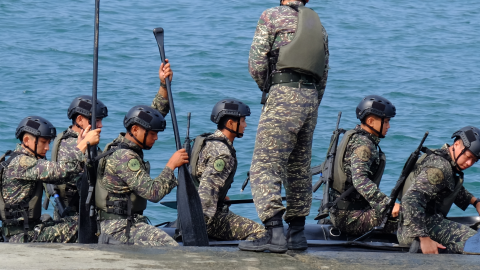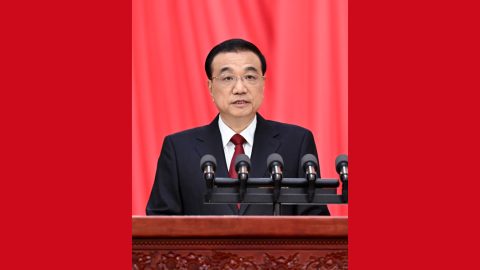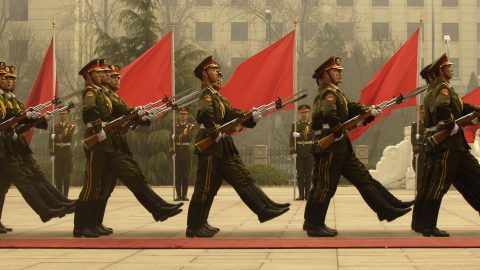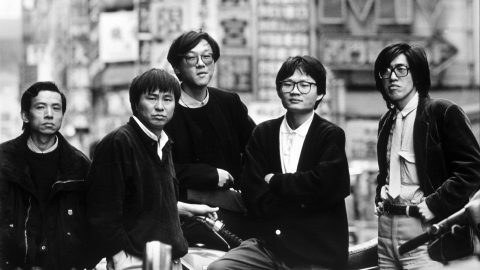Ben Goren is the co-founder and director of communications at the Taiwan Policy Centre, a non-partisan group set up to promote Taiwan in the U.K. His personal Twitter feed is clearly to the left of many who comment on Taiwan, though, and that positioning, plus his outstanding knowledge of Taiwan and its political situation, combine to make him a person of particular interest to anyone thinking about Taiwan. So here’s our interview with him. His answers were sent in an email, and this is the full text of the interview, edited for style and clarity. These are his personal views rather than those of the Taiwan Policy Centre.
1. Taiwan Policy Centre (TPC) is set up to push the U.K. government toward closer relations with Taiwan, and “to highlight the threats and injustices that Taiwan faces at the hands of the Chinese Communist Party and lobby the U.K. Government to take a stronger and more proactive stand in support of Taiwan on the global stage.” When was the Taiwan Policy Centre set up and how did it come about? Are there any similar groups advocating for Taiwan in the U.K., or is it a significant niche that needed filling? What made you want to get involved?
The TPC was formally launched in May 2021, but this came after two years of discussion and work to build our website. Oddly enough, David Spencer, my co-founder and CEO of the group, and I had been in contact previously when we both lived in Taiwan but then lost contact until David messaged me shortly after I had returned to live in the U.K. in 2019. David came to me with the project, and since it was a non-partisan group to promote Taiwan in the U.K. I was very happy to be invited to be part of the project.
One reason we saw a need for the group was that there was no other organization focused solely on Taiwan, with other groups usually only mentioning Taiwan as a corollary to China or Hong Kong. Inside Westminster there is the British-Taiwanese All-Party Parliamentary Group but its capacity and influence are limited, and outside Westminster, before the TPC was launched, there was no civil research and policy advocacy group dedicated to Taiwan. That’s something we have now changed.
My personal motivation stems from living in Taiwan over 20 years and wanting to repay the hospitality of the Taiwanese in a way, and in an area, that I might be able to have some impact for Taiwan’s benefit and continued self-determination, sovereignty and democracy.
2. Personally, you’re on the Left — you supported Jeremy Corbyn in the U.K., criticize free market policies and argue in favor of redistribution of wealth and equality. Am I right to think that this makes you slightly unusual in advocating for Taiwan within U.K. politics? The British-Taiwanese All-Party Parliamentary group (APPG) is largely made up of Conservative Party politicians and those from the Labour Party are (by my estimation) from the Right of it. If that premise is correct, why do you think that is?
My perception of the APPG is that a majority of members might be Conservative MPs, but some of that is a function of the large majority their party won at the last general election. The Labour Right tend to be more hawkish on foreign policy and more comfortable with it than the Left, which I think helps explain some of the seeming disparity. Despite this, the group does appear to be genuinely all party and is run on that basis.
I am on the Left ideologically and supported Corbyn’s leadership because of the policies he promoted that briefly became possible when he was the leader of the Labour Party. That’s why I joined the party in 2017 and campaigned for them in 2019. It’s why I then left the party in April 2020 as soon as the new leader took office. I left because I could see the policies would be discarded and the party would return to being something like it was under [Tony] Blair and [Gordon] Brown. In terms of advocating for Taiwan that has made me an outlier certainly because much of the Left is critical of empire and particularly the U.S. empire, and by extension often reduces Taiwan to a U.S. proxy containing China.
I feel what’s missing from that analysis is that China is also a huge powerful state, an empire in its own right, with clearly stated aspirations to expand its territory. Taiwan, in contrast, having been a victim of successive settler and imperial colonizations since the early 1600s, has every right to resist and refuse yet another round of this subjugation primarily because of the Taiwanese right to self-determination. The existence of Taiwan and the rights of Taiwanese can’t and shouldn’t be rationalized for the benefit of another country’s geopolitical convenience or to prop up the falling legitimacy and authority of a neighbor’s ruling elites and institutions.
3. Intuitively, a lot of people on the Left are against interventionist foreign policy. Do you think an exception should be made over Taiwan? And if so, what would your pitch to those who are principled but reluctant be?
International relations is a perpetual “fog of war,” be it legal, economic, diplomatic, military, informational, environmental. Sometimes, in order to defend something, it puts you in alliance with people and organizations you might otherwise be cautious about, or critical of, who seek the same outcomes but for different reasons. That’s why it’s so important that groups like TPC educate MPs and politicians and media about the historical context of Taiwan’s situation in a way that focuses on the rights of Taiwanese to self-determination and sovereignty under international law, period. Those are to me non-partisan principles. All other rationales are weak in principle and practice because there are few nations who do not have their own problems with exercising the same “shared ideas, values and freedoms” they demand other nations adopt.
The Left are instinctively against intervention because we recognize the devastating impact of imperialism and colonialism, not just as crimes committed in modernity but across the historical record. Invading somewhere that doesn’t belong to you, torturing, raping, killing, enslaving and subjugating the native population is wrong no matter who does it, where or for what reason. Intervening to push back against that should be no problem for the Left, and I see no contradiction between that position and supporting the intervention of the Allies in World War II to stop the Nazi empire. Likewise, if or when the People’s Republic of China (PRC) makes the error of invading Taiwan, I will have no qualms about any other nation joining battle in whatever form to defend and liberate Taiwan with and for the Taiwanese. Consistency is vital. If there’s a case for helping Ukraine defending itself there can be no caveat for not applying the same to the case of Taiwan. I am under no illusions when it comes to Taiwan about which empire it most benefits from aligning itself with, and it’s not the PRC.
In a sane world China would seek to build a regional collective of nations much like an East Asian EU, drop its claims to Taiwan and end its occupation of East Turkestan, Tibet and inner Mongolia. A mutual defense treaty between all sovereign members of that union would be more effective for China’s long-term security and economic interests than trying to break the first and second island chain and directly challenge the hegemony of the U.S. But this is a world of power and paranoia, and the biggest players are boxing themselves into a corner with Taiwan on the menu. Appalling if entirely too predictable.
Taiwan is not the exception for the Left, Taiwan is THE litmus test of applying a consistent and informed resistance to imperialism and colonialism. The PRC today is not the nation which championed anti-imperialism on the world stage and at the U.N. in the 1950s and 1960s. It is now a fully grown and proud participant in geopolitics, its former principles mostly used in the present to deflect criticism of the kinds of domestic brutalities, censorship, corruption and criminal malfeasance found in many other developed nations. The PRC today is saying “We are a challenger to U.S. dominion, we will institute a multi-polar world, and we are building this huge navy and air force to do that.” It also says quite clearly, “Taiwan is ours and we will invade and annex it by force if and when we desire.” Accepting that Taiwan should be blockaded, invaded, occupied, destroyed because China has the power to do that, or “it’s China’s turn” and it’s far away, just makes a person a critic of one imperialism only to justify another.
The hypocrisy is not in accepting and looking past the irony of the U.S. and Japan in defending Taiwan as an act of containing PRC imperialism, it comes in saying that the geopolitical record of those nations necessitates that Taiwanese don’t deserve help from them to resist being swallowed by the PRC. If the record of Hong Kong is anything to go by, it would be an absolute disaster for Taiwan, with security ramifications for all of East Asia and the western Pacific, especially and immediately Okinawa and the Philippines. Of course the Left should support protecting Taiwan’s sovereignty and self-determination as much as they do for any other threatened, coerced or occupied people anywhere else in the world.
4. If two people support foreign intervention over Taiwan, and one is a U.S. general who believes that supporting Taiwan is central to maintaining U.S. hegemony in order to maintain a world order with the U.S. at the top, and another supports Taiwan because they believe in the Taiwanese people’s right to self-determination, how does that affect the details of their support? Do both think Taiwan should buy weapons from the U.S., do both agree that Nancy Pelosi should visit? Are there smaller policy issues where there is a difference? How does it play out in details?
I agree that it does affect the nature of their support. Perhaps the general thinks Taiwan should buy more weapons from the U.S. and other nations as a “no-brainer,” but someone like me thinks supporting and defending Taiwan will be more complex than just a clash of conventional weapons, and that a lot of time and money can be, has been, wasted on seeking big-ticket items to deter PRC adventurism, or “this one trick they don’t want Taiwanese to know about has the People’s Liberation Army Navy (PLAN) fuming.” The general might see in the Pelosi visit a mixture of benefits and risks, while someone outside military and national security institutions would focus on what does Taiwan geopolitically gain from such a visit. Taiwan is its own country and it can invite who it wants. What I personally would say is that it should be on an invitation basis, and that Taiwan doesn’t and won’t benefit from unscheduled or uninvited visits. The new speaker of the House has declared he will come, but I’ve not seen an invitation from Taiwan yet. If Taiwan hasn’t made an invitation, then politicians from other nations should not declare their intention to visit. Instead, they can do a lot more at home, for example, by starting the process towards formally recognizing Taiwan as a country.
5. The last issue of the New Left Review has an article by a Ukrainian academic who points out that within Ukraine right now, “decolonizing” from Russia, outside of literal fighting, is mainly being expressed in symbolic and identity terms — pushing out the Russian language from schools, for example. He contrasts this with the original wave of decolonization efforts, which came with ambitious social revolutions and demands for greater equality. Do you think the movement to keep Taiwan separate from China contains any of those broader demands? We hear democracy, but is there anything else more ambitious?
Well, I would question the framing that there is one movement to “keep Taiwan separate from China,” since there’s not really one and it internalizes the argument that Taiwan is not separate from, or wasn’t / isn’t / shouldn’t normally be separate from, China. The process of decolonization in Taiwan arguably started in 1895 when the Republic of Formosa was announced but really took shape as a genuine anti-colonial or pro-democracy force in the 1930s. That process was suppressed first by World War II and then by the 37 years of martial law under the Chinese Nationalist Party (KMT) which followed. It then re-emerged in the 1960s and 1970s, flourishing once the KMT dictatorship had been replaced with democracy. Since the 1990s and particularly since 2000 there have been huge efforts to decolonize and democratize Taiwan, which we can now see in the way indigenous communities are represented in politics and media. Decolonizing the country of the KMT’s “cargo cult” of Chinese nationalism won’t be quick and hasn’t been without resistance and compromise. That could change and the process sped up dramatically, possibly in uncontrolled directions, if a future KMT presidency sues for peace and accepts PRC administration of Taiwan without a democratic mandate to do so, or if China attacks.
I think the ambition for Taiwanese is to remain sovereign, self-determining, democratic and “localized.” Taiwanese are quite capable of identifying themselves as a separate nation of people but with similar languages and cultures to China in the same way anglophone nations co-exist. The only demand Taiwanese have externally is to be recognized as a nation on the world stage and to join the U.N and other bodies and participate under their own name on the same terms as other nations do. The country meets all the administrative and legalistic conditions to do this, so it’s really just a question of when other nations are going to accept the de facto reality as de jure and how much pressure they face, internally and externally, to refrain from doing so.
6. How do you feel about working alongside/with people who you fundamentally disagree with about most things? Do you worry about compromise? Does it make you uncomfortable?
Interestingly, I’ve found it less worrying or uncomfortable than I anticipated, if only because with David [Spencer] I’m working with someone who is capable of separating the person from the ideology, and someone with experience in political communication, so our working practice is a bit like an ethical wall in a corporation or law firm. We debate, discuss and disagree on a wide range of topics but most importantly on Taiwan we are absolutely united on the core principle at stake, committed to defending that principle and willing to do the work to make the case for that principle to our respective audiences. We both recognize that Taiwan is an issue which transcends party or partisan politics. As such it is very important that the TPC speak to as broad an audience as possible across the political spectrum.
Since the founders are committed participants on our respective positions on the political spectrum and can find common cause, we feel that demonstrates our work is inclusive for anyone between those points. If the TPC was, for example, a purely conservative or socialist organization, it would radically limit its appeal and reach. We want to speak to all of Westminster, not just the MPs who mostly closely ideologically align with either of the founding members individually. Working in any kind of institution requires cooperation, patience, focus on the goal and compromise. When one writes a paper, the other edits it. What we end up with is a balanced analysis built on facts and strategically appealing to the broadest audience without transgressing any ideological red lines. It’s give and take, made a lot easier by that core agreement on the principle. Interestingly, Taiwan now appears to be an issue that in the U.S. commands consensus between Republicans and Democrats, and my sense is that a similar consensus on these principles is something that could also be found in Westminster, but it still requires raising awareness of the importance of Taiwan in relation to the interests of the U.K. among MPs. That’s a core goal of the TPC.
7. Do you have eyes on British Labour Party leader Keir Starmer after the Czech president-elect called Taiwanese President Tsai Ing-wen? I remember Brazil’s ex-president Jair Bolsonaro visited prior to his election. Do you have any indications that Starmer might be willing to support Taiwan in some capacity?
No. I’ve not seen any evidence thus far that Keir Starmer has prioritized Taiwan within his foreign policy plans. I think he’d probably support Taiwan in mostly a rhetorical capacity, aligning with the U.K.’s traditional allies in this regard, but currently I don’t expect him to take a lead on it. My sense is that Starmer’s international approach will be issues-based rather than principles-based. I expect him to be strong on things like the death penalty, female genital mutilation and honour killings, but in terms of a wider foreign policy framework it will probably be aligned with the goals of NATO and the U.S. At the moment a Starmer government [would not represent] a change or opportunity for Taiwan from the current administration. Labour MPs Stephen Kinnock and Catherine West speak well on the issue of Taiwan, but there does not appear to be a firm policy position for the party as a whole yet, and we fear that rather than a principled stance, Starmer and his shadow foreign secretary, David Lammy, will be reluctant to rock the boat, as has been the case with most recent Conservative administrations. That’s something we would work to rectify.
8. What are Taiwan Policy Centre’s plans for the coming months?
There are a number of issues we are looking at with a view to publishing further reports and hosting events and discussion in and around Westminster and beyond.
9. Finally, to avoid Taiwan becoming some abstract concept, rather than a real place with real people, what’s your favorite thing about Taiwan as a place? And what annoys you the most?
My favorite things about Taiwan are the hospitality of the Taiwanese (especially to low language-skilled white men like myself), low rates of petty crime and assault, affordable and accessible good quality healthcare, and the convenience and cost-effectiveness of services, especially the transport system. I like how the culture and zeitgeist is a nice balance combining the best of China and Japan. It’s a great location with quick connections to so many other countries in the region, but despite its size it still has areas that are completely remote. Environmentally it’s beautiful and amazingly diverse, from tropical to temperate, but it’s also an unforgiving country, with the highest risk from the three major natural disasters (typhoon, landslide, earthquakes) anywhere in the world. What annoys me would be the environmental damage done in the name of economic activity and convenience, the exploitative nature of the economy, the treatment of migrant workers, the death penalty and failed war on drugs, and conceding too much land to cars at the expense of bicycles and pedestrians. Brent Todarian does great work on that which Taiwan (and the U.K.!) can definitely learn from. I also think the Taiwanese have their own issues with racism and xenophobia and in my experience benefit greatly from increased exposure to other countries and cultures. This is why it is so important Taiwan should be able to participate in the international community under their own national identity, so they can share what works in Taiwan with the world and bring back to Taiwan what works outside of it.









Leave a Reply